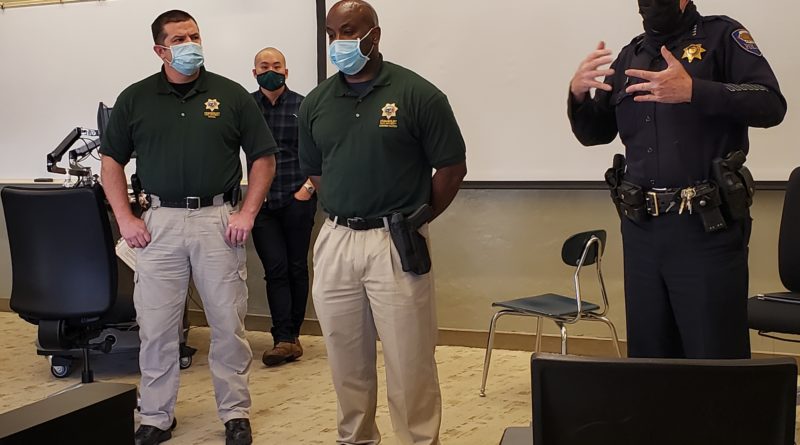APD and UPD Officers to Receive De-Escalation Training
On Nov. 13, the Arcata Police Department and the University Police Department held a Campus Safety and Policing Open Forum to discuss student, faculty and staff safety concerns.
APD and UPD addressed the policing issues that were revealed in the wake of Josiah Lawson’s murder in 2017.
“Clearly, we had made some mistakes and needed to evolve this organization,” said Brian Ahearn, Arcata chief of police. “In addition to that, we just took a look at how we were built, and how we were providing service, and really transformed the entire organization.”
In 2020, the National Police Foundation evaluated the APD in light of the murder investigation of Josiah Lawson and determined that its organizational structure and response fell short of national policing standards. In response, APD amended their organization.
These structural changes included adding a third division to APD, funding local de-escalation training for APD and UPD personnel and strengthening their ongoing relationship with UPD.
UPD Chief of Police Anthony Morgan is instrumental in the UPD’s attempts to work closely with the APD and engage with students on the HSU campus.
“Since I started as police chief in February, there’s really been a focus on how we can better engage the campus community,” said UPD Chief of Police Anthony Morgan. “We wanted to get some input from others on how we do it.”
An ongoing community concern is the over-involvement of APD personnel in mental health crises and their disconectedness with the community they serve. These issues are not just local, but have been brought-to-light on the national scale, as seen with the murder of George Floyd in 2020.
“What we learned from George Floyd’s murder, it wasn’t enough,” Ahearn said. “There’s a renewed call: civilian oversight, independent monitors, and completely removing the police department from any decision making when it comes to citizen complaints.”
To address these oversight issues, Ahearn said that the City of Arcata recently spent over $30,000 to fund ICAT training – Integration, Communication, Assessment, and Tactics – for both APD and UPD personnel.
Ahearn emphasized the assessment portion, which is a form of preemptive de-escalation. Before engaging in tactics on the ground, police officers will be trained under the ICAT model to assess a given situation and determine whether or not their intervention is necessary. The UPD acknowledged that they have room to grow.
“There’s always growth that can happen, but I think you need to give honor where honor is due,” UPD Lieutenant Peter Cress said. “I will say that coming in as an outsider, these guys have done a really good job, and it is a way of thinking.”
Their efforts in shifting their thinking to make the necessary institutional changes haven’t gone unnoticed by HSU staff members.
“It’s a breath of fresh air to have our [police] acknowledge and understand that this is a systemic issue and not a policing issue,” Off-Campus Housing Coordinator Chant’e Catt said.




